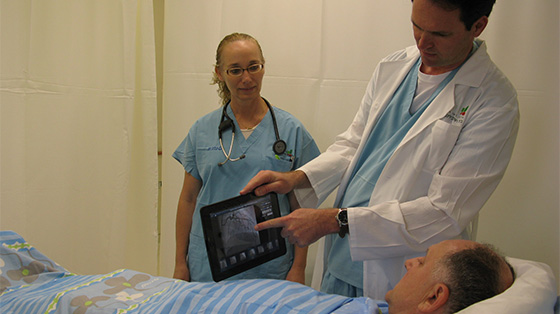The Heart and the Computer

“We are on the way to the big bang in cardiology: artificial intelligence and the development of breakthrough engineering and genetic technologies are expected to be at the forefront of the future war on cardiovascular diseases.”
Prof. Ran Kornowski, Director of Cardiology, Rabin Medical Center
The World Health Organization identifies cardiovascular diseases as the most common cause of death in the Western world. In Israel, Ministry of Health data shows about 10% of men and 8% of women suffer from heart problems. However, these men and women have an excellent reason to be optimistic – diagnosis and treatment capabilities in cardiology are progressing in huge steps, and in the next few years are expected to be at the center of a technological revolution that will dramatically change the medical world.
Three dominant components are expected to lead the way to these breakthroughs:
- Deciphering the human genome
- Developments in artificial intelligence and data mining for predicting medical processes
- Accelerated development of biomechanical technology and nanotechnology for heart medicine
Genomics is the medical field that deals with all aspects of humans’ genetic material. Due to rapid developments in genetic mapping and DNA sequencing technologies we can now find the causes of various diseases that are the result of genetic abnormalities. Proteomics, a branch of biology, examines the vast array of proteins in a cell that are produced by the genes of a particular cell, tissue, or organism.
Developments in genomics and proteomics may lead to significant breakthroughs in diagnosing and treating different diseases, including cardiovascular diseases. For example, cardiologists presently can only estimate a patient’s risk level of a cardiac event based on probability, but they are unable to precisely predict which patients will suffer a heart attack. But, with medical knowledge gained from genomics and proteomics, cardiologists can much more accurately predict future cardiac events.
Genomics and proteomics can also be used to develop innovative heart disease treatments that are both more effective and more accurate. Medical interventions will be possible not only through biological or genetic treatments, but also via natural methods, such as changing an individual’s diet and physical activity habits. Currently, these recommendations are given to everyone, but future recommendations will be personally tailored to an individual’s genetic and proteomic profile with potentially dramatic effects on coronary heart diseases.
The second component is the tremendous rate of progress in the computing field, driving data mining and artificial intelligence. Data collection will be used to detect, predict and track each person’s health. This information is accumulated and stored in a huge database that includes tens of billions of dynamic data points that are then updated according to changes in an individual’s health. It is not an exaggeration to state that computerized data mining and artificial intelligence will literally save lives.
The third component that completes the future picture of cardiology is biotechnology. We can already implant stents in arteries and valves in the heart to correct significant defects. These capabilities will be enhanced, eventually offering an alternative for most open heart surgeries. The combining of medical science with engineering capabilities is beyond our imagination and will provide solutions to most heart diseases.
Excerpts from Prof. Kornowski’s Article in Yedioth Ahronoth
Related Articles
Genetic Testing: Fact and Fiction
One of the major roles of genetic testing
in today's modern world is to provide a
simple and easy method of diagnosing
genetic diseases in order to save lives.
A Tomato a Day Keeps the Doctor Away
The juicy tomato, a daily feature of the Israeli diet, may be helping keep Israelis healthy.
Israeli Scientists Spice Up Chronic Pain Management
Ask people what they fear most about any medical procedure and they'll tell you it's not the operation itself but the pain that goes with it.